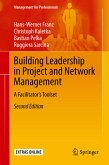All ready-for-use tools can be downloaded from the book¿s page at www.springer.com/978-3-540-93955-9
.
Hans-Werner Franz is a senior researcher and consultant as well as a member of the Management Board at the Social Research Centre (Sozialforschungsstelle) at Dortmund University of Technology, Germany. His well established track record includes total quality management, organisation development, and vocational training.
Ruggiera Sarcina is a senior researcher and consultant, collaborating with the Italian Chambers of Commerce in Italy and abroad. Her focus is on projects dealing with local development policies, cluster development, and innovation and internationalisation of small and medium-sized enterprises.
Dieser Download kann aus rechtlichen Gründen nur mit Rechnungsadresse in A, B, BG, CY, CZ, D, DK, EW, E, FIN, F, GR, HR, H, IRL, I, LT, L, LR, M, NL, PL, P, R, S, SLO, SK ausgeliefert werden.









